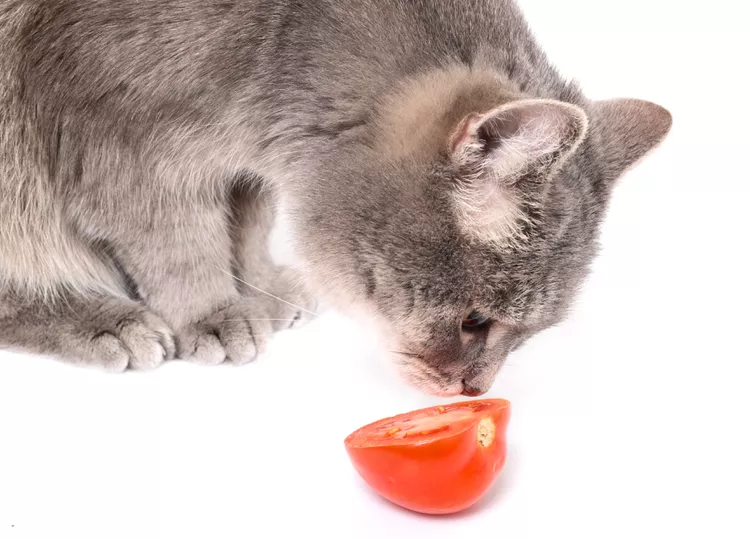
They say “curiosity killed the cat” because cats tend to want to check out everything in their environment, and sometimes cats do not know to avoid things that might harm them. If you are eating something, chances are your cat would like for you to share. As a practicing veterinarian, I am often asked about what human foods are safe to share with our cats, including if cats can eat tomatoes.
Cats are truly meat-eaters. In contrast with humans and dogs, cats are obligate carnivores. This means that at least 70 percent of their diet must be meat. Though cats will eat fruits, veggies, and grains, they do not require them. A cat cannot be a vegetarian or vegan.
Many owners wonder if they can or should feed “human” food to their cats. In general, a cat should derive all of their calories from high-quality, balanced cat food. However, giving a cat a treat can help strengthen the human-animal bond and may be used in training. Commercial cat treats may be offered, but small nibbles of food typically intended for humans may be used as well—as long as you know they are non-toxic to cats.
If tomatoes are on your menu, you may find that your cat is not interested, as most cats do not prefer this ruby-red fruit. But what if your cat does want to eat your tomato?
Tomatoes are a healthy fruit for humans, full of antioxidants and vitamins. Tomatoes are a great source of vitamins A, C, K, potassium, fiber, and lycopene, a compound found in high levels in tomatoes, that has been shown to have many health benefits for people.
With all of that being said about the health benefits of tomatoes for humans, it is a mistake to assume these properties hold true for cats eating tomatoes. Cats’ gastrointestinal systems are not designed to digest tomatoes, and if eaten in larger quantities, they may cause stomach pain, vomiting, or diarrhea.
It is important to note that green tomatoes that are not fully ripened, as well as their stems and leaves, pose a bigger danger to your cat. Unripened tomatoes and all parts of the tomato plant stem and leaves are toxic to cats. The toxic compound in these green parts of the plant is called solanine, and it is toxic to cats and many other animals. If a cat eats a tomato that is not ripened or the leaves or stems of a tomato plant, it may experience gastrointestinal distress, lethargy, a dangerously slow heart rate (bradycardia), and severe vomiting. Green tomatoes that have been cooked thoroughly are safer as they do not contain active solanine, however, they can still cause an upset stomach if eaten in large quantities.
If you have a cat that has a taste for tomatoes, you may safely feed them tiny amounts of the ripened flesh of the fruit from time to time. It is recommended that you limit the amount of tomato flesh eaten to just one or two bites, however. If larger quantities of the fruit are consumed by your cat, watch them carefully for any signs of gastrointestinal distress such as vomiting, stomach pain, or diarrhea. If any ill effects are seen, contact your veterinarian immediately.
In the case of sharing tomatoes with your cat, a few small nibbles of the ripened flesh of a tomato is likely not a cause for concern. However, not fully ripe tomatoes, stems, and leaves should definitely be avoided. If your cat eats any of the above, please contact your veterinarian right away.
Because cats are true carnivores and require that at least 70 percent of their diet be made up of meat, it is critical to ensure that they are being fed a meat-based diet. Treats should be kept to a minimum—no more than 10 percent of their total daily calories. If too many snacks or treats are given, the cat may become too full to then be able to ingest an adequate amount of its regular diet. This may lead to nutritional deficiencies and serious illness.
As always, if you have any questions or concerns about your pet’s health or what to feed your cat, you should always reach out to your veterinarian.
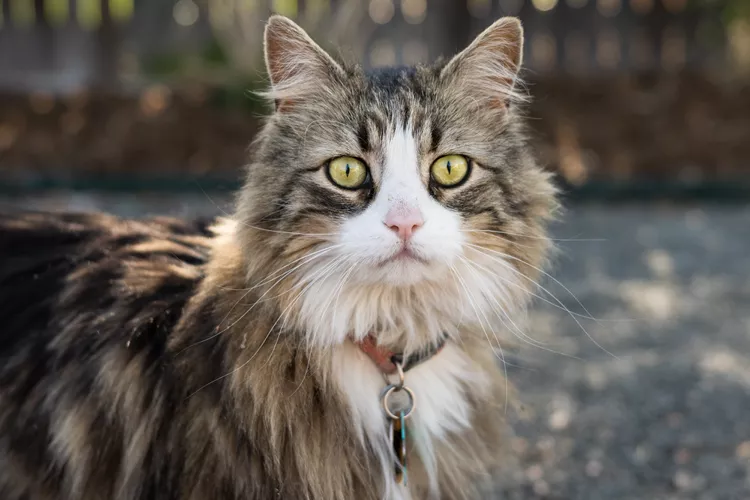
75 Unisex Cat Names
Our gender neutral cat names perfect for your feline friend, with a diverse selection of fun and inclusive options to fit your pet's disposition.
Why Does My Cat Stink?
Is your cat stinky? Find out about the causes of bad odors in cats and when it is something to be concerned about. Learn how to help your stinky cat.
Signs of Rabies in Cats
Rabies is a fatal and contagious virus that can affect cats. Learn about the signs of rabies in cats and what to do about them.
Can Cats Eat Dog Food?
Can cats eat dog food? In small amounts, it's unlikely to be a problem, but long-term feeding of dog food to cats can cause health issues and malnutrition.
Exploring the Different Types of Pet-Friendly Beaches
Are you looking for pet-friendly beaches? Learn about the different types of pet-friendly beaches, their locations, and tips for visiting them with your pet.
Pulled Muscles in Dogs
A pulled muscle is one of the most common injuries seen in dogs. What can you do if your dog pulls a muscle and how can you prevent it?
Fibrosarcoma in Cats
Fibrosarcomas are potentially fatal soft tissue tumors that can occur in cats. Learn the causes, treatment, and prevention.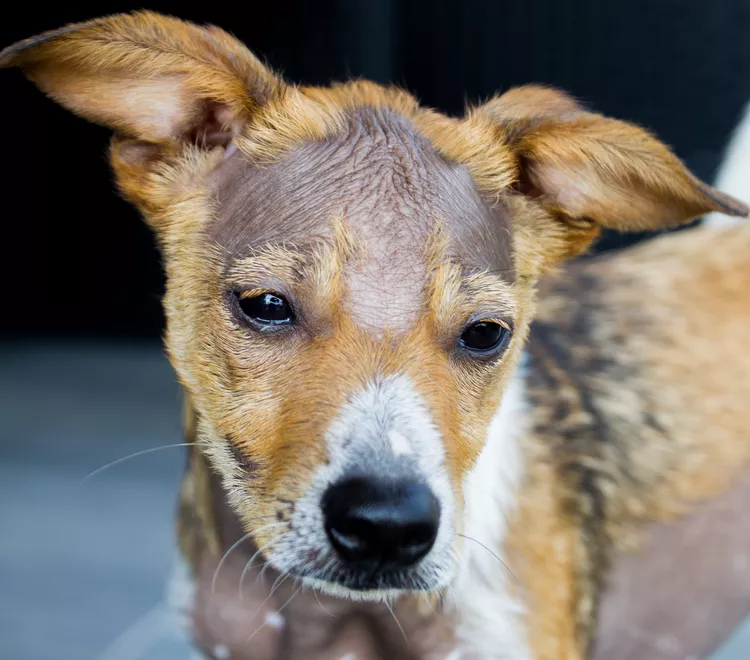
Alopecia in Dogs
Alopecia leads to hair loss and bald spots in dogs. Some breeds may be more at risk. Learn common causes, treatment, and prevention of dog alopecia.
Is Acetaminophen Safe for Dogs?
Acetaminophen is used by humans for pain and fever relief, but is it safe for dogs? Here's what you need to know before giving your dog acetaminophen.
Can Dogs Eat Almonds? Understanding the Risks and Guidelines
Can dogs eat almonds? While a couple likely won't hurt, it's best to avoid feeding your dog this nut. Learn the risks here.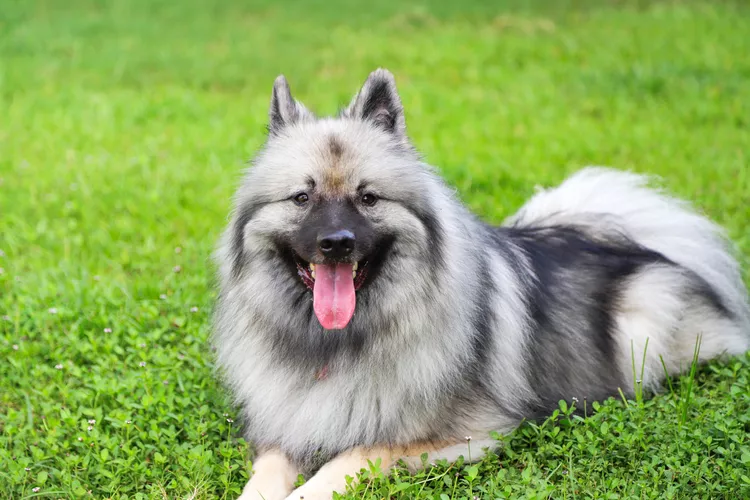
Keeshond: Dog Breed Characteristics & Care
Learn about the keeshond dog, also known as the Dutch Barge Dog. This fluffy spitz breed was bred to guard, but also makes a friendly companion.
Is Rosemary Safe for Dogs?
Rosemary is used both for cooking and as a supplement with many reported health benefits in people, so you may be wondering if it is safe to give to your dog. Rosemary is considered non-toxic for dogs but with some caveats.
7 Hybrid Cats Breeds
Hybrid cat breeds can make appealing pets since they look more exotic than domestic house cats, but they aren't for everyone.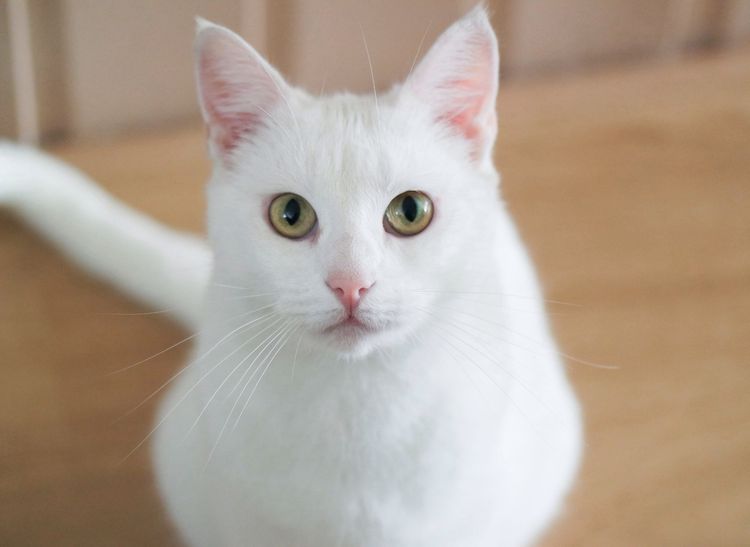
The Best White Cat Breeds to Keep as Pets
Several breeds can result in white cats with long or short hair. Find out the pros and cons of these white cat breeds.
11 Cute Pictures of Ragdoll Cats
Ragdoll cats are known for their beautiful coats and bright, blue eyes. Learn all about the breed, and check out some cute pictures here.
7 Reasons Why Your Cat Eats Paper, and How to Stop It
Is your cat eating paper? Learn why your cat is doing this, and find out how to put a stop to it.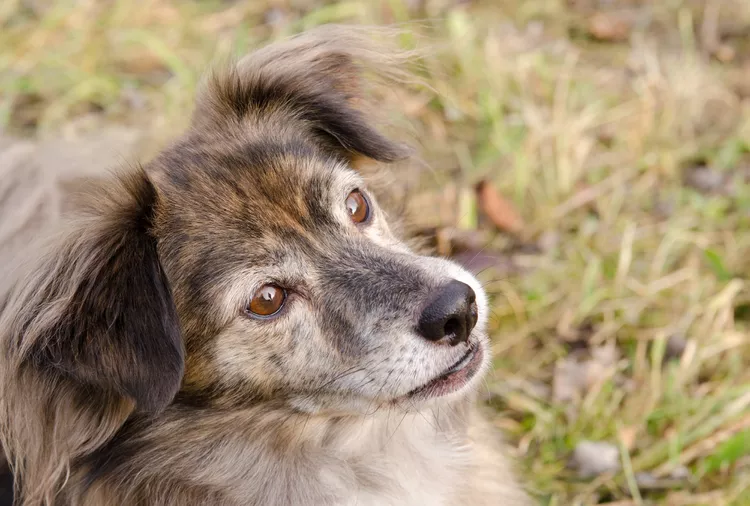
Feist: Dog Breed Characteristics & Care
Feists are small, short-haired dogs developed to hunt squirrels and catch vermin. These high-energy, affectionate pooches make great companion animals.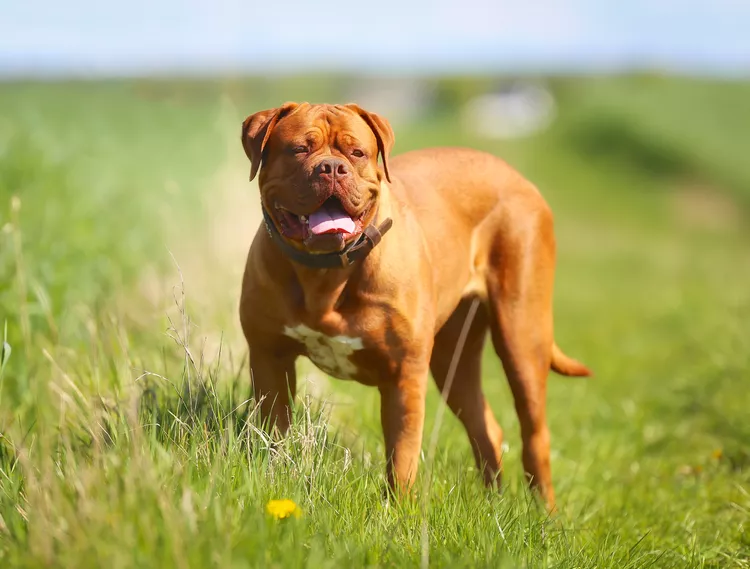
Dogue de Bordeaux (French Mastiff): Dog Breed Characteristics & Care
Learn about the Dogue de Bordeaux, also called the French mastiff. Although large and muscular, they’re known for their calm and gentle personality.
How to Stop Your Dog From Fearing Men
Many dogs have a phobia of men. Learn how to help your dog overcome its fear through desensitization and training while keeping everyone safe.
Why Dogs Eat Poop and How to Stop Them
Is your dog eating poop? Some dogs do this because of stress or illness. Learn how to prevent stool eating, or coprophagia, in dogs.